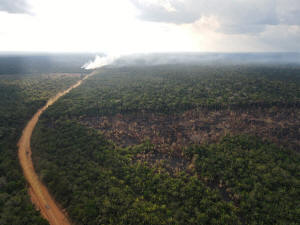How the new Latin America left is seeking a greener future
 Send a link to a friend
Send a link to a friend
 [May 16, 2022] By
David Alire Garcia [May 16, 2022] By
David Alire Garcia
MEXICO CITY (Reuters) - Colombia's
presidential front-runner Gustavo Petro wants, if he wins later this
month, to stop all new oil exploration and move his country to a greener
future.
That lines him up with Chile's recently-elected President Gabriel Boric,
a Millennial who has also pledged to take a firm stance on tackling
climate change.
As Latin America sees a resurgent 'pink tide' - with most of the region
set to be headed by leftists by the end of the year - the greener hue of
these newer leaders contrasts with the old guard "resource
nationalists," who have typically seen tight state control of energy and
metals as the best path to economic progress and self-determination.
The wild card? Brazil's Luiz Inacio Lula da Silva. The former president
and front-runner in his country's October election has long been
identified with support of oil development - but he is also eager to
contrast himself with far-right incumbent and climate skeptic President
Jair Bolsonaro.
Colombian voters will vote on May 29 in a first-round presidential
election where Petro, 62, aims to catapult the left to its first victory
in decades. The ex-guerrilla turned politician has tapped environmental
activist and rising progressive star Francia Marquez to be his running
mate.

Marquez, who would be Colombia's first Afro-Colombian vice president,
stressed in an interview that she and Petro would break not only with
the country's conservatives, who have long embraced oil and coal, but
also with fellow regional leftists like Mexican President Andres Manuel
Lopez Obrador, an unapologetic backer of fossil fuels.
"The point is that both the left and the right are fomenting a policy of
extractivism when humanity faces the challenge today of transitioning
from this extractivist economy to a sustainable economy," Marquez, 40,
told Reuters. "Life isn't possible without our planet."
Petro has vowed to freeze new oil and gas exploration, protect water
resources, and provide more security for environmental defenders in
Colombia, the world's most dangerous country for such activists.
In Chile, meanwhile, a new law is set to bind the country to achieving
carbon neutrality by 2050. Companies will have to adapt to new "borders"
put in place to limit emissions and pollution, Boric's environment
minister told Reuters on Friday.
LULA 2.0
In Brazil, the region's largest economy, Lula often hearkens back to the
prosperity that defined his previous 2003-2011 stint in power. Back
then, a commodities super-cycle fueled by surging Chinese demand for
steel, soybeans and other goods filled government coffers.
Lula also presided over state-run Petrobras' discovery of some 50
billion barrels of crude in offshore deposits, a tantalizing find that
was seen as a potential gamechanger for alleviating poverty.
[to top of second column]
|

A view of a tract of burnt Amazon jungle next to the Transamazonica
national highway, in Labrea, Amazonas state, Brazil, September 1,
2021. Picture taken September 1, 2021 with a drone. REUTERS/Bruno
Kelly/File Photo

In recent interviews, the 76-year-old has brushed off suggestions he
follow Petro's lead and shun potentially lucrative oil projects.
Even so, Senator Humberto Costa, a close Lula ally, sees a faster
green energy transition in Brazil if the left regains power,
including more solar, wind and biomass generation.
"I think the newest thing would be environmental and energy
concerns," he told Reuters, dubbing them "more urgent" than during
Lula's earlier government.
The lawmaker also said Lula would permit only "self-sustaining
development" in the Amazon rainforest, unlike Bolsonaro.
For traditional Latin American leftist leaders, control and use of
resources is bound up with a legacy of exploitation dating back to
colonial times - and their policies center on keeping
profit-maximizing foreign and private hands away from their natural
riches.
Lopez Obrador last month won congressional support to nationalize
the exploitation of lithium, a crucial battery metal that Mexico
does not yet produce. The Mexican leader has since said he wants to
join Chile, Argentina and Bolivia to advance likeminded development.
He has also sought to strengthen state oil firm Pemex and national
electricity company CFE's dominance in their respective sectors,
canceling competitive oil and renewable power auctions, and
prioritizing the dispatch of power from CFE plants, even though they
overwhelmingly burn fossil fuels.
In Bolivia, one of the region's poorest countries, the need to spur
development by exploiting gas fields has long clashed with
environmental concerns. Current socialist President Luis Arce is
also keen to make the most of his country's natural resources -
including gas and lithium - but in a break from the resource
nationalists he has indicated he is open to bringing in outside
help.

In the campaign homestretch in Colombia, Marquez is keen to avoid
unrealistic expectations for Petro's green agenda.
"Will this change happen overnight? No, it won't happen in four
years," she said. "But we need the political will to say, 'Yes, we
must begin the transition."
(Reporting by David Alire Garcia in Mexico City; Additional
reporting by Gabriel Araujo in Sao Paulo; Editing by Christian Plumb
and Rosalba O'Brien)
[© 2022 Thomson Reuters. All rights
reserved.]
This material may not be published,
broadcast, rewritten or redistributed.
Thompson Reuters is solely responsible for this content. |